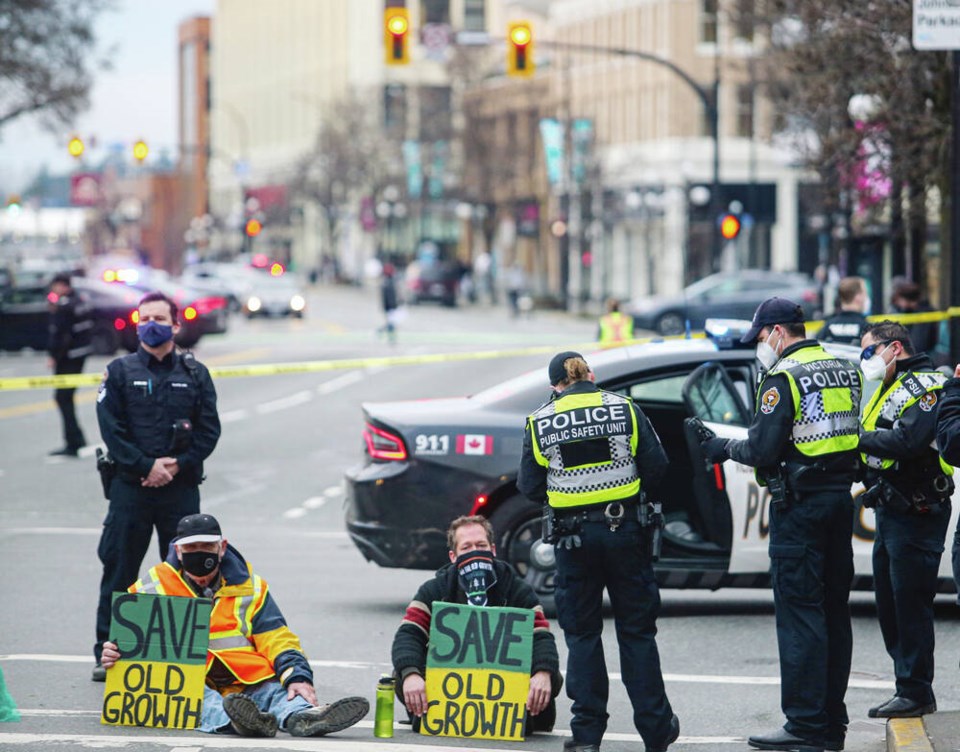I wrote last week that our social contract is fraying at the edges. I had in mind a spate of incidents, country-wide, where protesters increasingly flaunted the conviction that might makes right.
We had “anti-colonial” activists tearing down the statue of Captain James Cook and throwing it in Victoria’s Inner Harbour.
Last fall, anti-vaxxers mobbed the entryways to hospitals and schools across the province. A couple of weeks ago, the Pat Bay approach to Swartz Bay was blocked by anti-logging activists.
And of course, there was the clogging of Ottawa’s streets by a “freedom convoy” opposed to vaccine mandates.
The point here is not that these protests were illegal, though they certainly were. Canada has laws on the books against vandalism, destruction of property and blocking thoroughfares.
The point is that in many of these incidents, law-enforcement authorities stood by and did nothing.
The reason, in part, is that police chiefs are hesitant to confront protesters who enjoy a degree of public support (though not their tactics.)
But there is more to it than that. The rights of the few have come to supersede the needs of the many. This is a reversal of a long-standing principle.
A good part of it has to do with alterations to our social contract.
Before the Canadian Charter of Rights and Freedoms became law, our constitution was unwritten.
Certainly there were statutory provisions and case law that gave a general sense of basic freedoms. However, nowhere in the original Constitution Act — our founding document — were those freedoms explicitly laid out.
That changed in 1982, when the charter was proclaimed. Now those rights were codified, and more importantly, codified in a way that vaunted the role of individuals over the society around them.
Introduced as “fundamental freedoms,” these rights were personal, not communal. They were cast as freedom of conscience and religion; freedom of thought, belief, opinion and expression, including freedom of the press; freedom of peaceful assembly; and freedom of association.
A weak attempt was made to suggest some limits. It was noted in the prorogue to the charter that these freedoms are subject to “such reasonable limits … as can be demonstrably justified in a free and democratic society.”
Yet in the context of such a powerful and evocative declaration of individual entitlement, the rights of society became more of a footnote, and a frequently ignored footnote at that.
Interestingly, such unlikely soulmates as Saskatchewan’s Allan Blakeney and Alberta’s Peter Lougheed both opposed such trenchant language.
They saw in it the subordination of Parliament to the courts. In this, they were sadly correct.
What perhaps they didn’t foresee was a fundamental reordering of civil society, with the individual, not the community, at its centre.
Catch-and-release court rulings are a nod in this direction. The harm done to chronic offenders by imposing a lengthy jail sentence counts for more than the harm of releasing them into the community.
What, if anything, can be done? We’re certainly not rewriting the charter. Its authors saw to that with an amending formula that rendered any such effort stillborn.
All we can hope is that this movement, like others before it, exceeds public tolerance and provokes a backlash.
The father of economics, Adam Smith, wrote that “there is a great deal of ruin in a nation.” Right about now, the emergence of the over-mighty individual sounds like that.
>>> To comment on this article, write a letter to the editor: [email protected]



